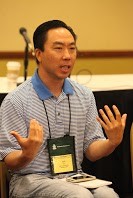The Rev. Jin S. Kim is not your typical Presbyterian pastor. His congregation is not your typical Presbyterian congregation. And his message is not one you’d hear from the pulpit of that typical Presbyterian congregation from that typical Presbyterian pastor.
Because Kim’s message for those gathered Aug. 2 during a Big Tent workshop on “Advanced Challenges in Multicultural Leadership” is the same he’s been preaching from the pulpit of Church of All Nations in Columbia Heights, Minn., the congregation he founded in 2004. Today, he counts a Kenyan pastor and a Native American pastor among his staff. The church also has a community pulpit.
The message is simple: “You cannot reconcile with racism.”
So, in what he calls his “high risk, low anxiety church,” Kim poses additional questions to the ones required for membership.
“Are you willing to fight ‘white privilege’ as well as ‘white supremacy’?”
To say that some of his congregants have found these statements too “uncomfortable” for membership is an understatement.
Yet, in this context, Kim, a child when his family emigrated from Korea in 1975, is not talking about the “white supremacy” of the Ku Klux Klan or the Aryan Nations.
Rather, he’s talking about a state of deference to white people ― perhaps an unconscious subservience but a subservience nonetheless ― that he deems a cultural flaw in Koreans of his parents’ generation.
This stems from the reaching of a ceasefire in the Korean War 60 years ago and, in a way, from Korea’s liberation from Japanese occupation by “white people” following World War II.
Growing up near the University of South Carolina, Kim experienced this attitude first-hand, as the young immigrants were urged “to move away from blackness towards whiteness.”
To his parents’ generation, raising children in a foreign country where one had to learn English without benefit of ESL classes and where official paperwork often limited heritage choices to “White/Black/Other,” they saw only one option for the future: choose “white.”
In his parents’ eyes the harsh reality was, “blackness in America ideologically represented failure,” says Kim. “White people represented success to many in the Asian community.”
Kim is the first to admit that this “a horrible thing to say.”
But, he quickly adds that the culture of the times in football-crazed South Carolina didn’t do much to dissuade his parents’ thinking. Growing up, he recalls many so-called football experts being quoted as saying African Americans didn’t have “the tools” to be a quarterback. Then there were the questions about whether African Americans could be smart enough to coach.
“Check the Super Bowl statistics,” says Kim. “The so-called experts have been proven wrong.”
What does football have to do with church?
Successful coaches with successful teams, like successful churches, are willing to take risks.
Big Tent, Aug. 1-3, was a celebration of Presbyterian Church (U.S.A.) mission and ministry organized around the theme “Putting God’s First Things First.” It was composed of 10 national Presbyterian conferences, more than 160 workshops and special events to mark the 30th anniversary of the formation of the PC(USA) and the 25th anniversary of the opening of the Presbyterian Center here.

